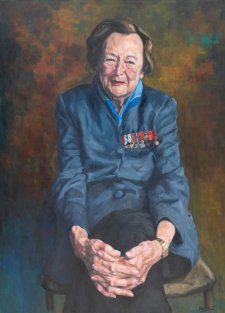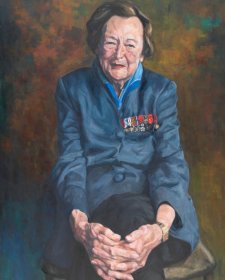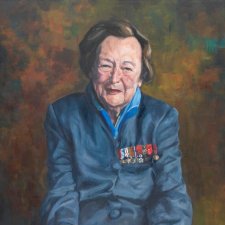Nancy Wake AC (1912–2011) was one of the most-decorated women of the Second World War. Born in Wellington, New Zealand, she came to Sydney with her parents at the age of two. She was educated in Sydney but left there in 1932, ending up in London, where she undertook a journalism course. She moved to Paris to work as a journalist, but set up house in Marseilles after marrying Henri Fiocca, a French businessman, late in 1939. Later, when Wake was on a Nazi hit-list and code named The White Mouse, Fiocca was executed for refusing to divulge her whereabouts to the Gestapo. In 1940, she began driving an ambulance, delivering supplies to refugees and English prisoners, and carrying packages and messages between Cannes and Marseilles by bicycle. Between 1940 and 1942 she helped to maintain escape routes through France that saved the lives of hundreds of Allied troops. The French Resistance arranged her removal to England, where she trained as a Special Operations Executive, learning to parachute, kill silently and handle weapons. Parachuted back into France with codes in 1944, she became Chef du Parachutage and took charge of the 7000-strong Maquisard resistance fighters, who played a part in sabotaging German communications systems on D-Day. Her incredible efforts over the course of the war won her the George Medal, 1939–45 Star, the France and Germany Star, the Defence Medal, the British War Medal 1939–45, the French Chevalier of the Legion of Honour, the French Croix de Guerre with Star and two Palms, the US Medal for Freedom with Palm and the French Medaille de la Resistance. These medals are on display in the Australian War Memorial. After the war Wake married an Australian and returned to live in Port Macquarie. She went back to London in 2001, residing at the Stafford Hotel until illness forced her removal to the Royal Star and Garter war veterans' home. Until she was 90 she had never received an award under the Australian honours system, and she had said that the Australian government could 'stick their medals where the monkey stuck his nuts'. However, after intensive lobbying by Prime Minister Howard she received the AC from Governor General Peter Jeffrey in London in March 2004, and then accepted a discretionary allowance from Australia. Wake wrote an autobiography, The White Mouse (1985) and Peter FitzSimons' Nancy Wake: A biography of our greatest war heroine was published in 2001.
- About us
- Support the Gallery
- Venue hire
- Publications
- Research library
- Organisation chart
- Employment
- Contact us
- Make a booking
- Onsite programs
- Online programs
- School visit information
- Learning resources
- Little Darlings
- Professional learning







